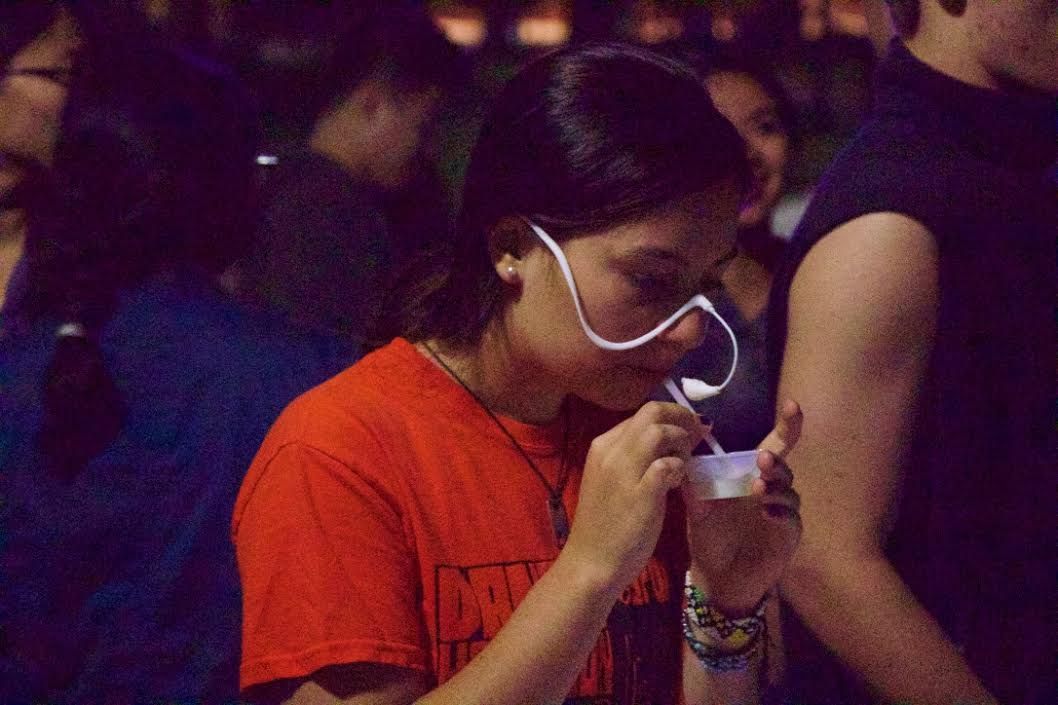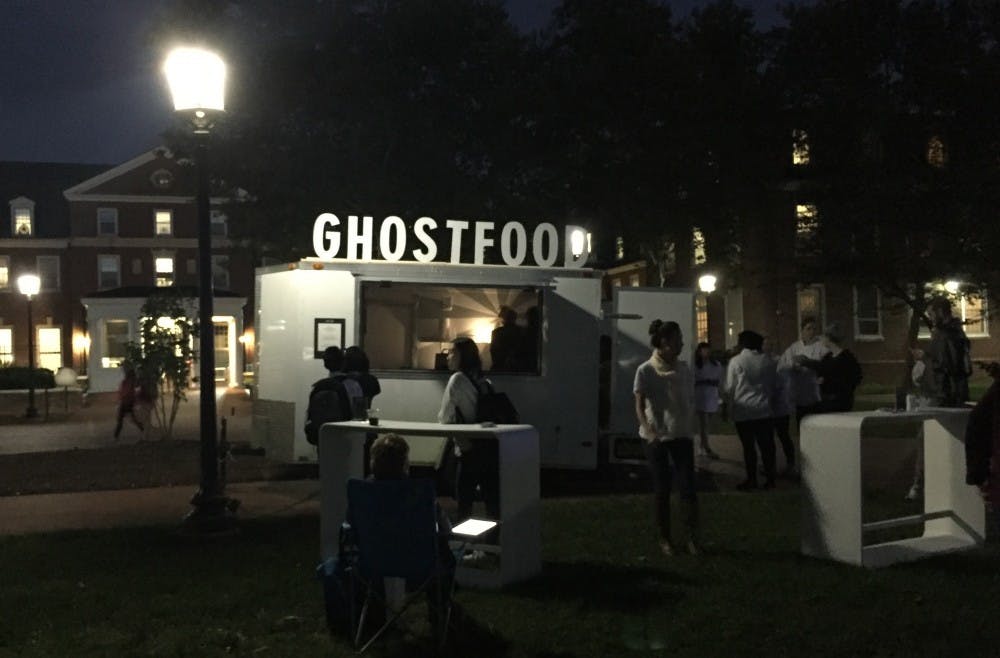By ANITA LOUIE For The News-Letter
Artist Miriam Simun and the students in her practicum course presented “GhostFood,” an interactive exhibit that addresses the possible impact of climate change on the future of food.
The project, displayed Monday on the Freshman Quad, spotlights foods that could possibly go extinct because of the animals and plants used, such as cod from the Atlantic, peanut butter and jelly with peanuts from Arizona, and chocolate milk with cocoa from West Africa.
Crowds of students congregated around the exhibit’s white food truck expecting a typical campus food giveaway but were served bland-looking food on simple white trays by the practicum students acting as servers. Attendees were also given a plastic nosepiece called a DOSD.
The DOSD produces an inhalable scent, mimicking the sensation of eating cod, peanut butter or chocolate even though the food served, although similar in consistency, was not actually that food.
Rachel McCoy, a senior enrolled in Simun’s course who helped put on the exhibit, said she enjoyed watching people engage with the project and react to the food.
“Some people were really weirded out,” McCoy said.
Simun is collaborating with Hopkins and the Contemporary, an avant-garde local art museum, to present the exhibit. The course is co-taught by Contemporary Program Manager Ginevira Shay and Director Deana Haggag.
Simun said that the inspiration for “Ghost Food” stemmed from her fascination with how smell impacts taste.
“All of our experience of flavors is olfactory,” Simun said. “There was just something magical in it, something amazing about it.”
She mentioned how artificially adding taste through smell stimulation was not unlike the food industry, where much of the taste comes from additive flavors rather than the food itself, although she has no specific plans to industrialize her DOSD olfactory invention.
“There’s a different process and a different kind of education and different base of knowledge, but it’s been really great,” Simun said.

A major part of the practicum course has been preparing to put on this exhibit, which will be presented throughout Baltimore this semester, including a presentation in front of Penn Station on Oct. 15. Shay, from The Contemporary, said she was excited by the large turnout for the project.
“We’re just really excited about giving the students at Hopkins the opportunity to interact with something different, have a different experience and have something to have a conversation about,” Shay said.
McCoy said that she was encouraged by the reception to this first presentation.
“I think this one’s more to raise the question and to get people thinking without imposing one person’s idea or answer,” she said.
Simun was similarly excited by the first performance, as she stood toward the back of the area and observed the servers interactions and the guests’ reactions. She, along with her students, had a busy day with six hours of preparation including cooking and setting up.
In presenting her work, Simun said that she prefers to focus on social issues as a broader, interconnected entity, and is interested in posing questions to the public aboutperception and decisions.
“It’s not about ‘is this the right way or this is the wrong way,’ or ‘this is how we should eat or this is how we shouldn’t eat’ — it’s how do we wake up to the idea that we’re creating and how do we decide what we want?” Simun said.
“GhostFood” is not the Simun’s first experimental art exhibition. She created the “Agalinis Dream” project in which she captured the normally undetectable scent of New York’s only endangered flower that blooms once a year in a DOSD and paired it with a special cocktail that amplified the scent. She also created the controversial “Human Cheese” project where she made cheese out of human breast milk.
Simun said she cares more about the ideas and concepts rather than any business propositions, and she merely wants to get people to look at normal everyday objects from a different perspective.
On Nov. 2, Simun will present “GhostFood” in conjunction with a panel discussion with Anand Pandian, an associate professor in the anthropology department. Political Science Department Chair Adam Sheingate, who also teaches a course on food politics, will moderate the panel in Mergenthaler Hall.





